
Skiing in a state of control
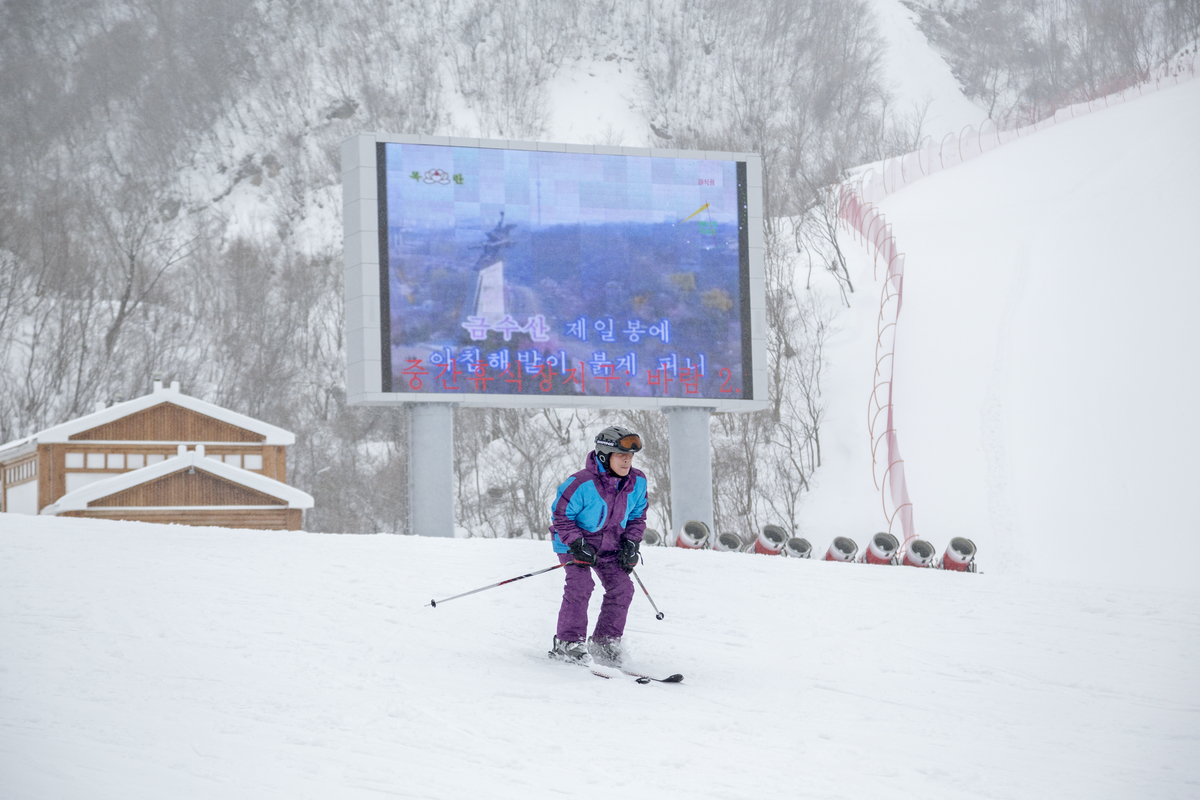
Oppressive, prickly and nuclear, North Korea is the last place you’d want to ski. And yet a visit to the country’s newest – and only – luxury ski resort brings adversaries together for a few days of relative normalcy and fun. That’s a good thing, right?
A lid came off the moment our bus left Pyongyang and the anxiety that had built up curled away like steam. The strange reality of five nights in North Korea could finally crossfade with each mile into a world of even stranger familiarity. We were off to Masik Ryong, the most exotic ski area on earth.
I leaned my head on the window and watched the capital’s skyscrapers recede behind the forested humps of the Masik mountain range. Solitary figures trudged across fields sprinkled with snow toward skeletal orchards that would bloom with pears in spring. A soldier pedaled down the lonely concrete road on a one-speed bicycle, his oily assault rifle bouncing in a wicker handlebar basket.
It was hard to imagine that there could be anything great about skiing in North Korea but four of us had signed up to go as an extension to a larger package tour in and around Pyongyang.
For a few days in mid-February the country celebrated what would have been former leader General Kim Jong-il’s 73rd birthday with mass dances, flower exhibitions and synchronised swimming shows. It’d been a truly fascinating time – visiting the Dear Leader’s waxy corpse in a dimly lit mausoleum, learning about the crimes of the United States imperialist aggressors at an oddly gorgeous Fatherland Liberation War museum, and once gagging on spicy dog soup – but the realities of the place had begun to wear on me, too.
The United Nations released a 372-page report on North Korea’s human rights record on February 17, the day after North Koreans celebrated what would have been Kim Jong-il’s 73rd birthday, if you believe Soviet birth records, or his 72nd birthday, if you believe North Korean accounts. Regardless, the report is largely considered to be the most authoritative and exhaustively researched record of human rights on the world’s most isolated pariah state. The Chinese, a staunch North Korea ally, rejected the report on March 17. The North Koreans say it is full of lies.
Phrases like “forced abortions” and “deliberate starvation” appear in it frequently. The report recounts the story of a man sentenced to a labour camp for unintentionally soiling an image of Kim Jong-il printed in a newspaper that he used to mop up a spilled drink.
Some things in the report do not make sense. Women are not allowed to ride bicycles, according to the report, but I saw hundreds of women doing it.
“There is rule by law,” the report stated, “but no rule of law.”
On Friday March 28, the UN Human Rights Council in Geneva adopted a resolution, brought by Japan and the European Union and backed by the United States and South Korea based on the report’s findings, calling for the UN Security Council to hold to account those responsible.
An Australian tourist in another group had just been detained for allegedly handing out Christian materials in a country with zero tolerance for Christians. A member of our own group had been accused, wrongfully, of tampering with his visa to allow him to stay longer. I’d come in on a tourist visa, which my North Korean handlers had assured me was OK, since I’m more of a travel writer these days than a watch-dog journalist. Still, I had to bite my tongue, bow before the statues and feign reverence when told how much the leaders loved their people. Soon a 212,000-word United Nations human rights report would spell out in gruesome detail just how brutal that “love” could be.
And now we were off to go skiing? Positioned 175km east of Pyongyang near the coastal city of Wonsan, the Masik Ryong Ski Resort officially opened for business on New Year’s Day, when Marshall Kim Jong-un – youngest son and heir of Kim Jong-il – donned a black furry cap, rode a chairlift to the top of Slope 6 and called his creation “impeccable”.
“A miracle”
Legions of “soldier-builders” from the Korean People’s Army had hacked the birch-tree hillsides of 1,362m-high Taehwa Peak into 11 north-facing runs. Below them stood two trapezoidal hotels with 120 rooms, a swimming pool, karaoke bar and pleasing restaurants serving pickled fern, sesame-seed-encrusted salmon and juicy slabs of beef. Never mind that millions of North Koreans are malnourished and have no electricity. This “miracle of socialist construction” had taken only one year to complete and yet a huge question still lingered: why build it at all?
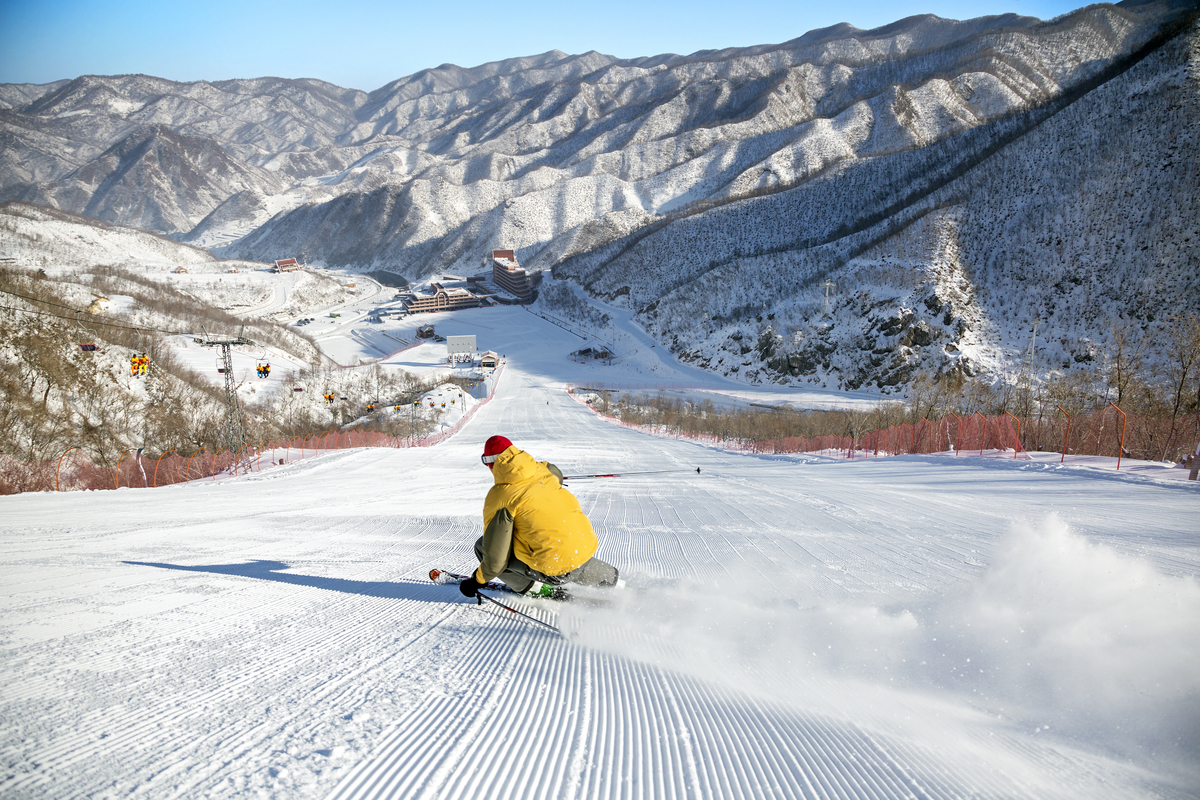
It seemed silly, and yet as the bus rattled on the sense of relief was real. After a week of worrying about what we could and could not do, we were off to a simpler world of snow and gravity that any skier anywhere can understand. Would the resort really be just for the elite? Was this all some sort of elaborate plan to further prop up the regime? What mad tourist would want to go there?
I didn’t know. But when the ski area came into view my hopes did soar. If anything can inject light into stone it is a universal desire to play.
Up the mountain
A light snow fell that first morning. In the predawn light, a dozen or so men with stick brooms had lined up in ranks and methodically swept the roads and pathways clear. A giant monitor the size of a billboard at the base blared folk tunes while videos of swaying flowers, crashing waves and fiery missile launches flashed across the screen. The slopes were empty for the moment.
Unlike in the South, which will host the next Winter Games, North Korea doesn’t have much of a ski culture. Estimates say about 5,000 of the country’s 23 million people have skied, many of them in the army. Before Masik there was one ski area in the country’s remote north but it was tiny and it may or may not still be open. Masik is easier to reach but no less accessible. Tickets cost about €30 (CHF36) a day. A good job pays $10 (CHF8.7) a month. Skis, boots, poles, waterproof-breathable clothes, goggles, helmets and good gloves are expensive and hard to find. At Masik you can hire it all. I made way downstairs to the rental room below Hotel 2.
I expected no line – there were exactly nine westerners at the resort and I’d met them all within hours of arriving – but the room was actually jammed. As many as 200 Koreans, not including the 30 or so ski instructors, were milling inside and out, waiting to rent brand new everything.
“Some Koreans have loads of money,” Amanda Carr, a trip leader on her 44th trip to North Korea, told me later, because they have access to hard currency. Skiing will be free for many other Koreans as a perk for their work units performing well or for some other “revolutionary” effort. When Kim Jong-un visited over New Year’s, he declared no one would pay for anything during the length of his stay.
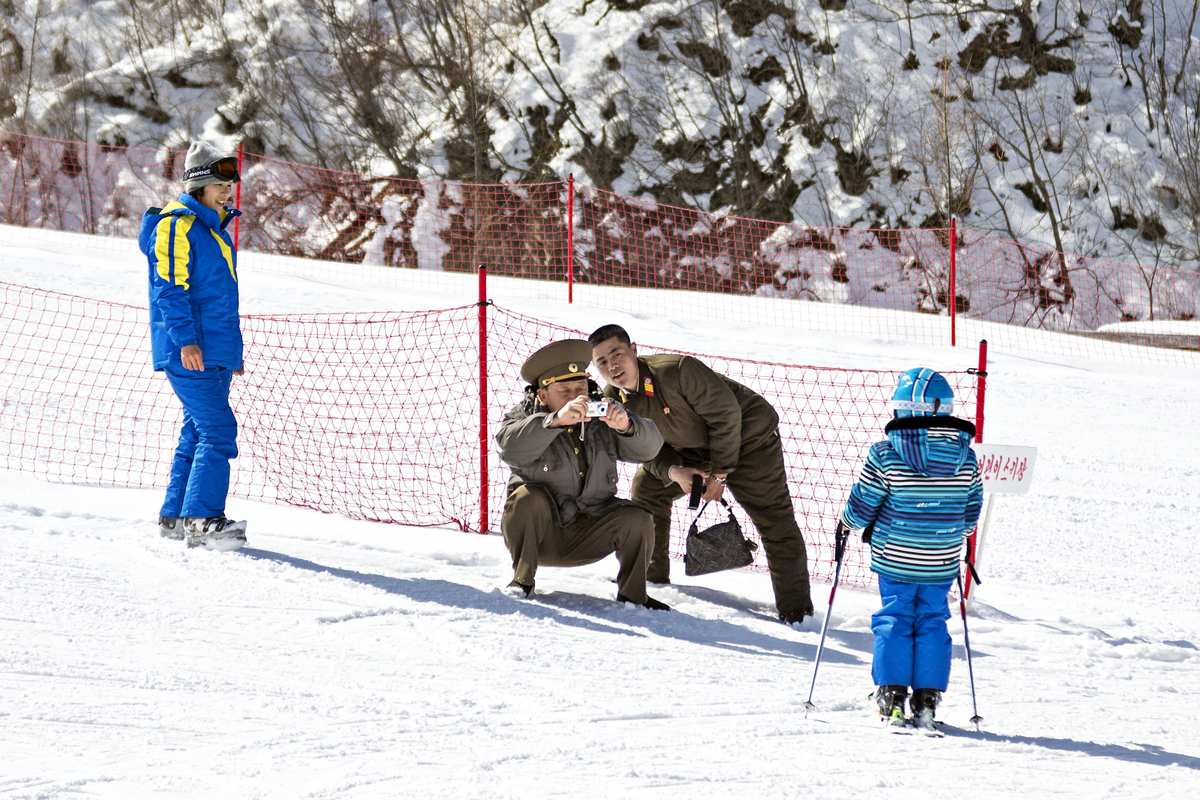
Skiing, a human right?
The fact that Masik had opened for skiers at all is kind of remarkable because getting ski lifts to North Korea wasn’t easy for the regime. Switzerland was a natural place to shop when it came time to buy Masik’s lifts; after all Kim Jong-un and his sister allegedly went to school in Bern, where the young dictator-to-be presumably came in contact with ski life. A firm based in St Gallen offered to sell some for about CHF7 million but the State Secretariat for Economic Affairs (SECO) blocked the deal.
“This is obviously a prestigious propaganda project for the regime,” SECO spokeswoman Marie Avet told reporters at the time. Selling “luxury goods” like ski lifts to North Korea would violate UN sanctions intended to punish Pyongyang for its nuclear programme anyway.
Denied this basic “right” the North Koreans fumed.
“The ‘democratic countries’ advocating ‘equality of all people’, ‘defense of human rights’ and ‘freedom’ are resorting to criminal hostile act of violating the dignity of a sovereign state in a bid to deprive Koreans of their elementary right to enjoy a cultural life,” a choppy statement released through the Xinhua Chinese media service wailed. Even the Swiss enjoyed skiing when it was a poor and backward place, it spat. “It is self-deluding to say that ski belongs to those high-class people.”
It invited parody and yet the North Koreans had a point, too, albeit one they probably didn’t mean to make. The right to ski should be an elementary one because of everything else it involves: a right to travel, a right to happiness – a right to be in charge of your own trajectory.
The lifts the resort eventually installed likely came in through China, though a recent UN report detailed how the North Koreans are very adept at skirting sanctions. I counted 20 new Swedish snow cannons, two new Bombardier snow-grooming machines and saw a shop selling $300 ski jackets and Swiss chocolates. I wondered about quality. As my friend Dan Patitucci, a Swiss-American photographer, and I rode the first lift, two mechanics on the ground 30 metres below were twisting a tower bolt with a large wrench. “Make it tight!” I joked.
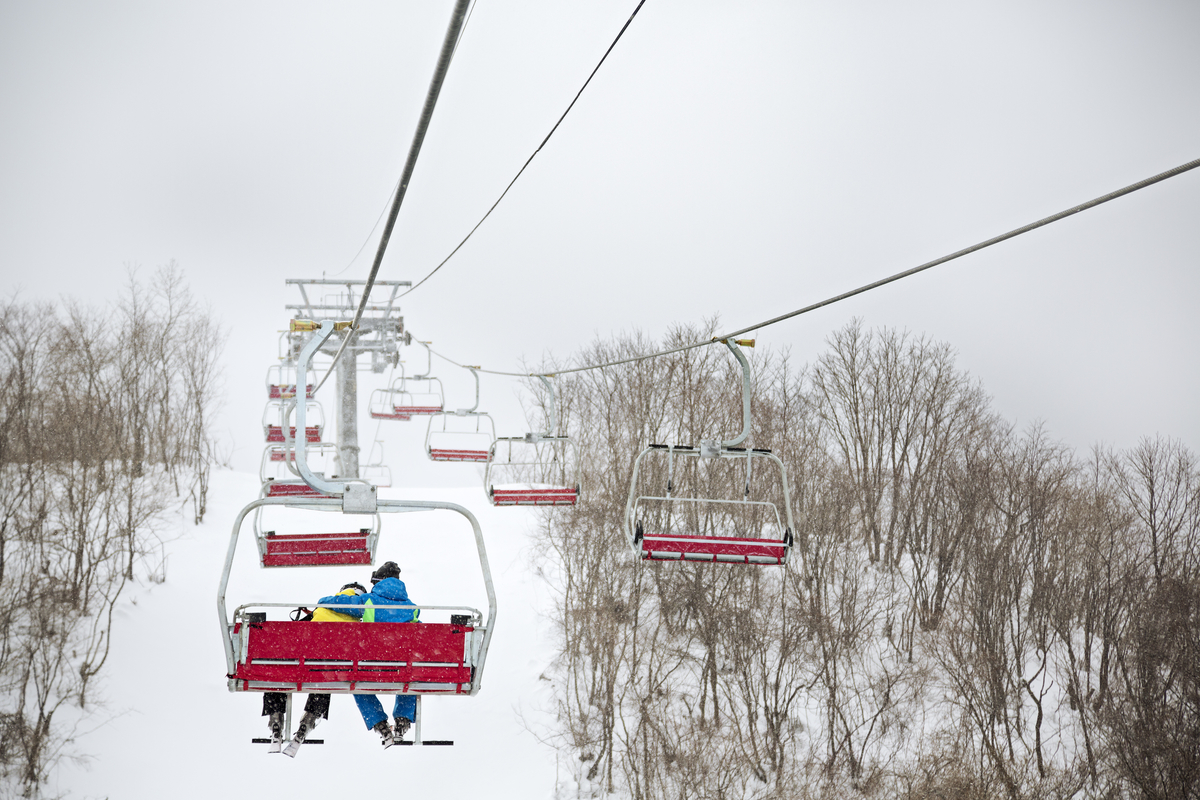
It would take 43 minutes to ride 710 vertical metres to the top. It takes ten minutes less to ride three times that length to the top of the popular mountain in the Swiss Alps, the Schilthorn. But many Koreans just ride the lifts – no skis – so keeping them slow may make it easy for them to outrun it when it comes time to get off. Once at the top, lift operators bowed in welcome. A man from Pyongyang posed for a picture with me. The maître d’ at the top station restaurant, an octagon with a large fish tank inside, said he loved to ski. Other than that, we were alone.
“Well, let’s go ski in North Korea,” my friend said, and he pushed off down the slope.
A way to dialogue
The skiing is actually – amazingly – good. The grooming machines had made only one pass up the slopes, which left two 15-metre-wide sideburns of untracked powder snow on either side of the prepared portion of the piste. Nearly all of the Koreans remained on the beginner-friendly bunny slopes below, meaning the entire upper mountain was ours. You could ski fresh snow all the way down and – roughly an hour later – be making another virgin run right next to your own tracks.
“It’s the first time in a week where no one is around to watch us,” said Jana Panova, a Czech law student in our group, when we stopped halfway down. “It’s quite something.”
We weren’t the only ones enjoying a little less scrutiny. At the base, Koreans who had clearly never been on skis before were testing the finer points of stopping, often with the help of an orange safety fence. Kids played on sledges, giggling. On the lifts you’d see North Koreans cuddling on the way up and then waving enthusiastically at you on the way down.
“For local people this is a very good thing,” said one North Korean guide whom I’ll call Mr. Kim just to be safe. “This is very new for us. You will see many people here from Wonsan just for the day.” Wonsan, a city of 200,000 people or so, was just 24km east. Granted, to come here you’d still need a travel permit and transport, not to mention cash.
I slept well in Hotel 1, which could have been on loan from the Swiss resort of Saas Fee. Rooms had tasteful wood walls, heated floors and firm beds with crisp sheets. There was a large shower and the windows could seal out the blaring billboard almost entirely. Even the levered doorknobs looked Swiss.
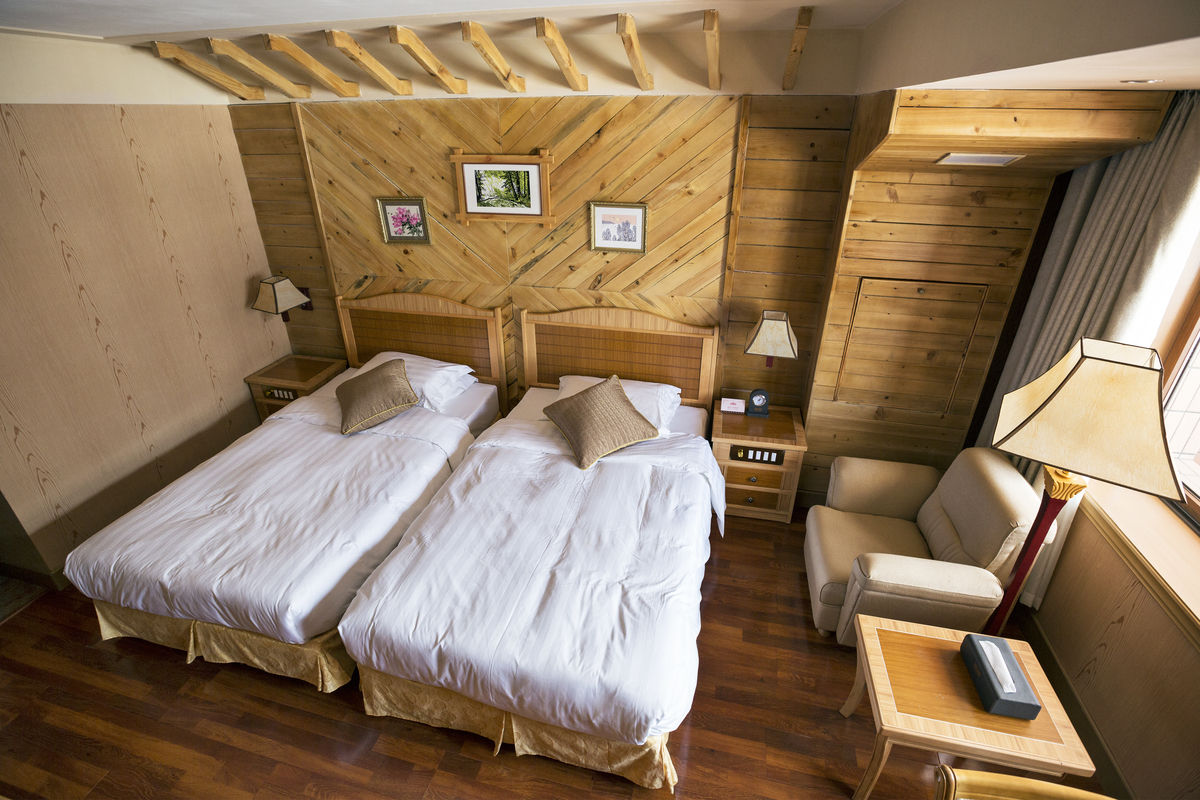
Our last day dawned cold and clear, which made the snow even finer and fluffier than before. More people had come up, too. A man in the drab olive livery of the People’s Army took pictures of his family in the snow. Seeing how tall I am – 2m – a bubbly local asked me to snap a sword-size icicle hanging off a roof and give it to her. I did it, which seemed to make her happy. The ski instructors peeled off in three groups down Slope 6, each set doing drills. I tried to ski with them once but got a stern “Stop!” from the lead instructor.
Dialogue
The ski resort and all of the other prestige projects that have cost hundreds of millions of dollars have failed “to have any immediate positive impact on the situation of the general population,” the recent UN human rights report states, and it’s hard to argue against that.
At the same time, coming here, mingling with North Koreans with no minders, waving to them on the lift, and sharing the joys of skiing, no matter how frivolous it may seem, does accomplish something that diplomacy cannot: It puts a face on great faceless enemies and exposes everyone to something a little closer to the truth.
“It does no good to sit at home and say you shouldn’t come to a place like this,” said Pete Tupper, a Briton who runs a ski business in China and came to Masik to help teach some guides how to ski. “That’s just grumbling. Tourism creates dialogue.”
The regime has spent between $200 million and $530 million in recent years on edifices, murals, statues and other “idolisation propaganda” to glorify the great leaders and the Workers Party of Korea, the UN report notes.
It also spent at least $35 million building the ski resort and at least another $67.6 million on land development costs, according to a business plan obtained by NKNews.org.
Other “prestige projects” have popped up largely in Pyongyang, a city reserved for only the most loyal families. You can now play in wave pools at the Munsu Water Park, watch dolphins do tricks at the Rungna Dolphinarium and ride roller coasters at the Kaeson Fun Fair.
All pictures: Patitucci Photo

In compliance with the JTI standards
More: SWI swissinfo.ch certified by the Journalism Trust Initiative












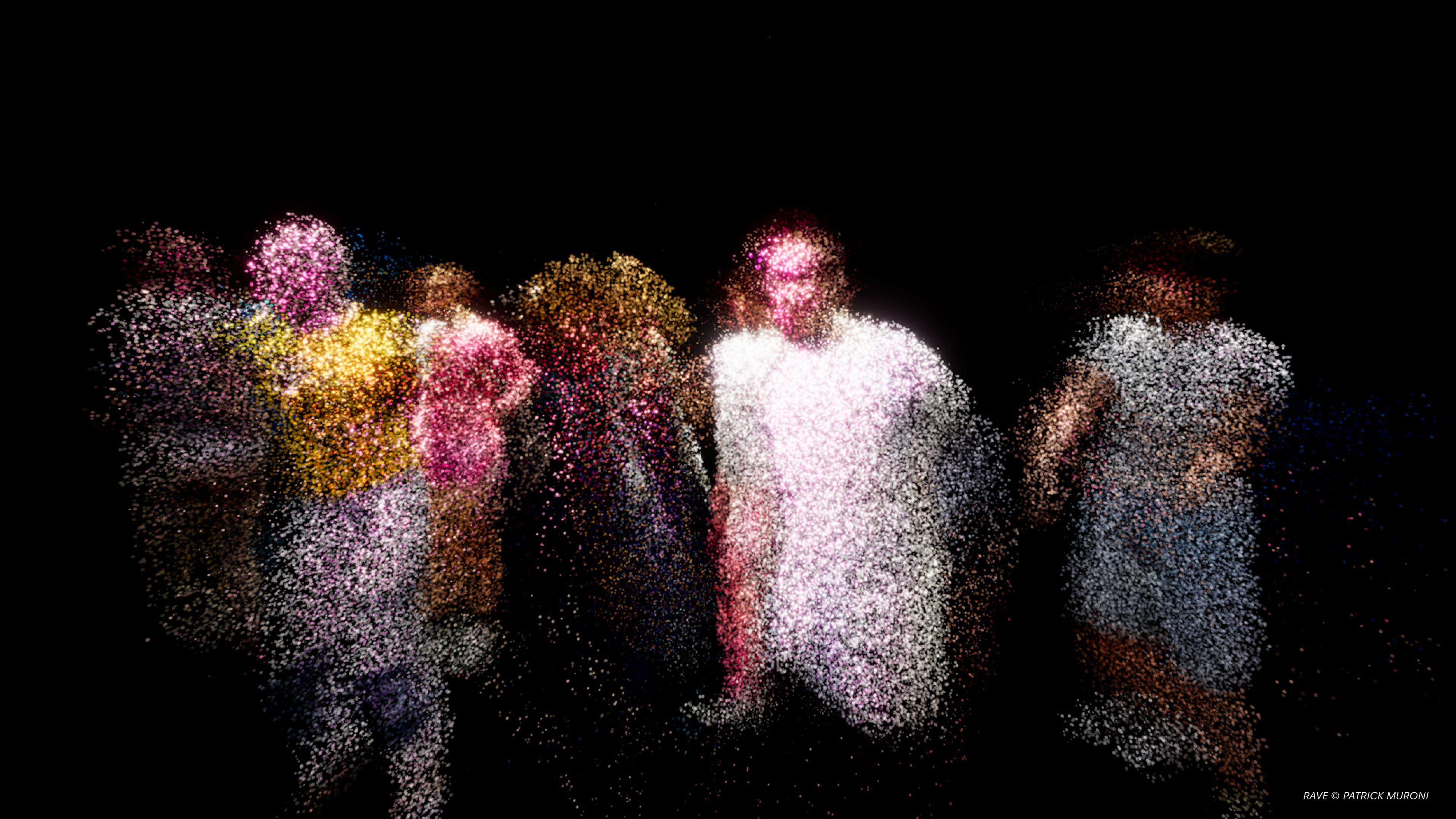










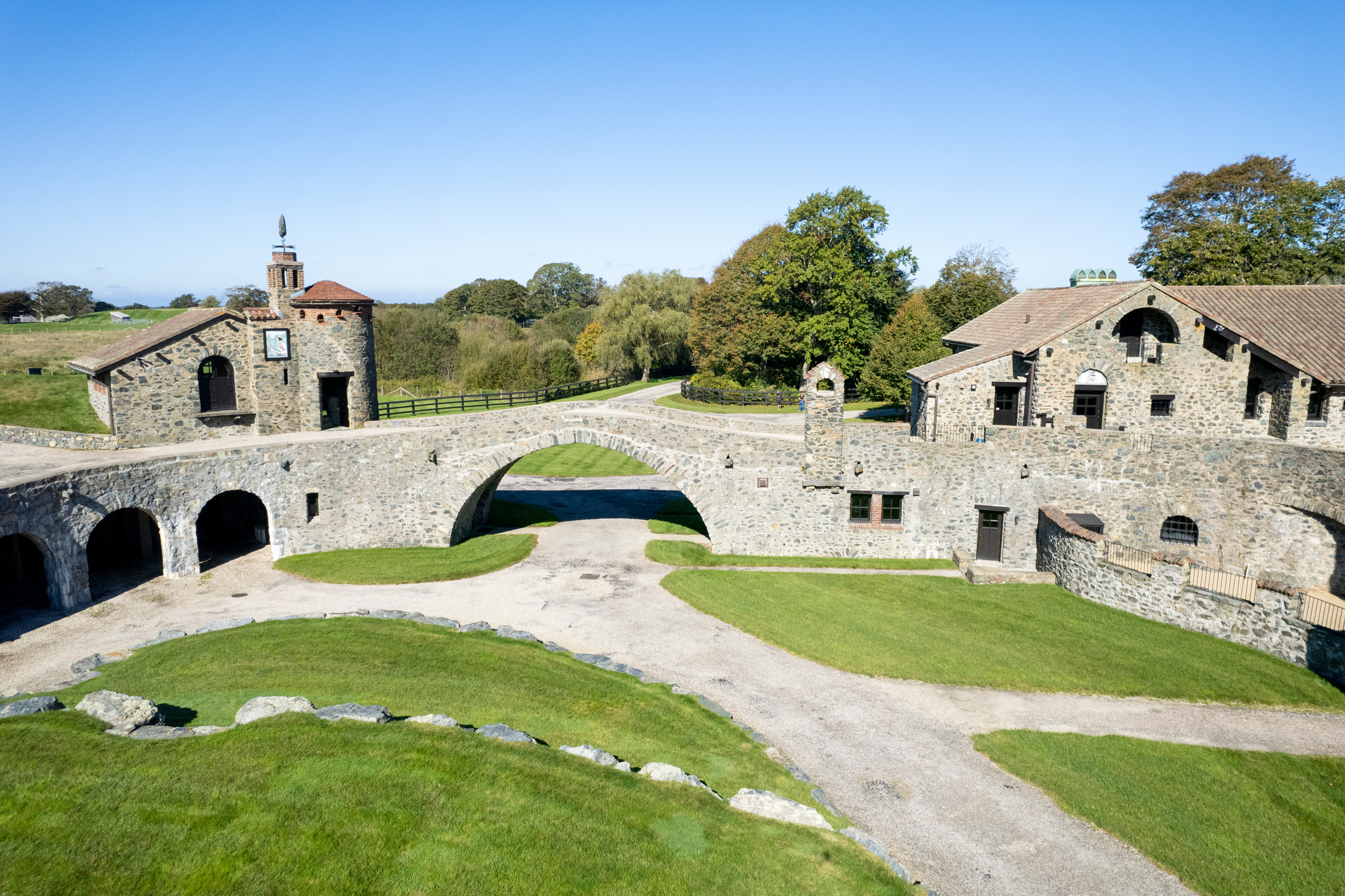


You can find an overview of ongoing debates with our journalists here . Please join us!
If you want to start a conversation about a topic raised in this article or want to report factual errors, email us at english@swissinfo.ch.